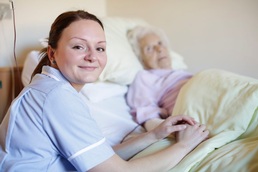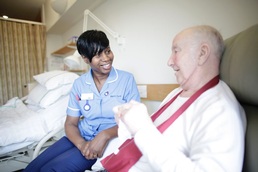Hospice nurses say giving people the best death possible is a 'humbling privilege'
 Hospice care in the UK provides support for around 120,000 people every year living with a terminal illness and, increasingly, those with an illness other than cancer are receiving crucial support.
Hospice care in the UK provides support for around 120,000 people every year living with a terminal illness and, increasingly, those with an illness other than cancer are receiving crucial support.
Hospice care takes place in the community, undertaken by thousands of nurses with specialist knowledge as well as inside a hospice. Nurses help people come to terms with their illness and offer practical support to ensure as many people receive the best death possible.
A report at the end of last year carried out by the Dying Matters coalition, that was set up in 2009 by the National Council for Palliative Care (NCPC), revealed nearly half of people would feel uncomfortable talking to someone who has been recently bereaved.
Hospice nurses are there to support not only people at the end of their lives but families around them, providing care, support and guidance that continues after a person has passed away.
Responding to the report, which also found nearly a fifth of bereaved people felt they had no one to talk to, Dr Ros Taylor, national director for hospice care at the charity Hospice UK, said: “It is tragic that talking about bereavement still appears to be such a no go area for so many people in the UK, and that we are not at ease with loss, even though it is a universal human experience.
“Hospices have longstanding expertise in providing emotional support to dying people’s families both before and after bereavement and they also help raise public awareness about dealing with dying and death in their local communities.”
Hospice nurses have specialist psychological knowledge as well as expertise in areas such as medication and pain control to provide people with dedicated care that will work to allow people to die in an environment they have chosen.
The National Association for Hospice at Home (NAHH) represents hospice at home services in the UK and champions the right for someone choosing to die at home by researching and developing best practice of end of life care.
Kay Greene, vice chair of the NAHH, said: “Our member services maintain normality for both patients and their families minimising the disruption to day to day living. Good care at home can reduce the need for hospital and GP appointments, enabling patients to decide through informed choice what they personally need to sustain them.

“Being at home offers patients comfort, familiarity, security and convenience which comes from a known environment therefore a key aim in enabling this is to prevent unnecessary admission to hospital and the distress this may cause at a crucial time in the lives of patients and families.”
The NAHH believes that it is the ethos and culture and not the size of a hospice provider that will determine how well hospice care is provided.
Celebrating the work of locally run hospices, which are often small charities relying on donations to operate, Ms Greene continued: “Local Hospice at Home services are able to provide practical care and support in a responsive way – which is most valuable to family carers enabling them to maintain their loved ones at home if this is their choice.”
Ms Greene continued: “Hospice at Home nurses are skilled in knowing and understanding the fears of patients and families – good communication and expert knowledge of symptom control reassures families and ensures the experience is managed and that families can enter the bereavement phase knowing the best care has been achieved.”
So what makes palliative nurses most proud about the work they do? Dee Sissons, director of nursing at Marie Curie, explained: “The thing I know makes them most proud is what a privilege it is and how humbling it is to be with someone at the time they die. Other nurses will say they are most proud that they are able to make a difference in the death and give a person the ‘good death’ they wanted.
 “I recently went to visit someone who actually died while we were visiting them, and although we knew they were terminally ill, their death was still unexpected at this time. The day before no one had realised they would be passing away the next day and it had a huge impact on me. It had been 11 years since I had last been with a person when they died, and that was my dad.
“I recently went to visit someone who actually died while we were visiting them, and although we knew they were terminally ill, their death was still unexpected at this time. The day before no one had realised they would be passing away the next day and it had a huge impact on me. It had been 11 years since I had last been with a person when they died, and that was my dad.
“Supporting people is very important and it is a privilege. People let us in at very difficult times and the nursing team would say that they felt they made a difference and that is what they are most proud of.”
The care provided by Marie Curie includes the volunteer service Marie Curie Helper who helps with daily activities such as visits into town to provide companionship and emotional support. Home care teams also work in partnership with local social care services and rapid response teams meet the needs of people needing extra immediate help to provide relief to family members caring for a person as their needs become more complex.
Ms Sissons continues: “We support not only the person with a terminal illness but their family and those around them.
“Probably our best known service is our team of nurses who go into people’s homes to provide one to one care. Generally this is overnight care, usually for eight or nine hours. This reassures carers, and the patient, that their loved one can get a good night’s sleep.”
Although when Marie Curie was first set up it provided hospice care for people with cancer, like many other hospice care providers, both locally and nationally there has been a movement to provide care for people with any terminal illness and not just for those with cancer.
St Nicholas Hospice in Sussex revealed that although hospices might once have been places for only cancer patients, hospices now care for people with all kinds of illness such as those in the advanced stages of multiple sclerosis, motor neurone disease, heart and lung disease.
St Nicholas Hospice is just one of the charitable hospices in the UK which collectively need to raise £1.8m a day to continue operating, a cost which amounts to over £9,000 per hospice each day. The charity provides care across West Sussex and Thetford and believes hospice care is not just about death, but helping the people and their families affected to live with dying, whether in a hospice or, more often, within their own homes.
Macmillan cancer support is a nationwide charity caring for people with cancer.
Adrienne Betteley, end of life care programme lead, explained: “Usually people in their last months of life are cared for by generalist nurses in care homes or in their own home and Macmillan are there to provide support when the generalist nurses are struggling to manage, this could be with physical or emotional care. Our nurses can prescribe the right medication or advise other professionals and educate the general nursing population because they have specialist knowledge on the complexity of the care needed.”
“They also help patients if they are struggling to come to terms with a diagnosis and use a range of their skills to tease out issues they have and help patients come to terms with their diagnosis and prognosis. The nurses have dedicated time to really acknowledge and support people’s concerns.”
There are currently 799 specialist palliative care nurses working mainly in the community and an innovative programme being followed by Macmillan is involving more palliative nurses in the early stages of a terminal diagnosis to improve life for that person. Most have at least five years of nursing experience and two years in cancer or general palliative care.
Ms Betteley said: “Often palliative care professionals only get involved with care late on in the journey, for example in the last months. However this programme is innovative because it allows professionals to support a patient for longer than is usually provided, sometimes as long as two years, starting even when they might still be receiving chemotherapy to ensure they receive specialist care as early as possible.”
Hospice nurses continue to meet the complex needs of those in the final stages of a terminal illness, support families come to terms with a diagnosis and help other care staff to give someone the death they want.
Hospice care is taking place across the country to help as many people as possible to have the death they deserve, often in their own home and surrounded by the people they care about most.
Latest Features News
 28-Nov-19
2019 Election: Labour pledges £10.8 bn for free personal care while Boris Johnson sidelines social care
28-Nov-19
2019 Election: Labour pledges £10.8 bn for free personal care while Boris Johnson sidelines social care
 18-Oct-19
Podcast: Wendy Mitchell and dementia: 'My biggest fear is not knowing who my daughters are'
18-Oct-19
Podcast: Wendy Mitchell and dementia: 'My biggest fear is not knowing who my daughters are'
 30-Sep-19
World's oldest diver aged 96 says 'never accept the fact you are getting old'
30-Sep-19
World's oldest diver aged 96 says 'never accept the fact you are getting old'
 27-Sep-19
Exclusive: Care minister backs care workers' call for time off to grieve and attend funerals
27-Sep-19
Exclusive: Care minister backs care workers' call for time off to grieve and attend funerals
 20-Sep-19
Podcast: Gyles Brandreth urges care workers to learn poetry with elderly
20-Sep-19
Podcast: Gyles Brandreth urges care workers to learn poetry with elderly